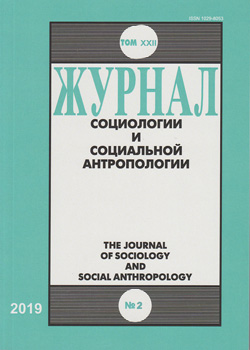History and Perspective of Social Mobility Studies after ‘Mobility Turn’
Keywords:
social mobility; mobilities paradigm; mobile methods; big data; J. Urry.
Abstract
This paper critically examines classical and modern studies of social mobility (SM): the author analyzes the basic methodological principles of crucial works in this field to present a brief overview of important discussions on current publications. Critics of the 'traditional' SM program argue that the application of the conventional principles of analysis is not relevant for the 'new conditions' associated with large-scale global changes both in the social and sociological environment: the spread of postcolonial and feminist approaches, de-professionalization trends, erasure of national boundaries and blurring boundaries between social classes. The turn towards individualization in modern SM research and development of biographical analysis allow focusing on the subjective aspects of changing positions in the social space. However, these approaches are retrospective. The author particularly examines the implications of the 'mobile turn' for SM research: the 'weak' and the 'strong' programs for advanced research that have the resources to describe the complex and controversial mobilities dynamics at various levels. The author argues that social mobility research should focus on the strong program that implements different scaling of the spatial and temporal boundaries, the possibilities of using key components of the mobilities paradigm — mobility systems, instantaneous time.
Published
2019-09-20
How to Cite
Nikishin, E. (2019). History and Perspective of Social Mobility Studies after ‘Mobility Turn’. ZHURNAL SOTSIOLOGII I SOTSIALNOY ANTROPOLOGII (The Journal of Sociology and Social Anthropology), 22(2), 93-117. Retrieved from http://jourssa.ru/jourssa/article/view/291
Section
Mobility Studies

